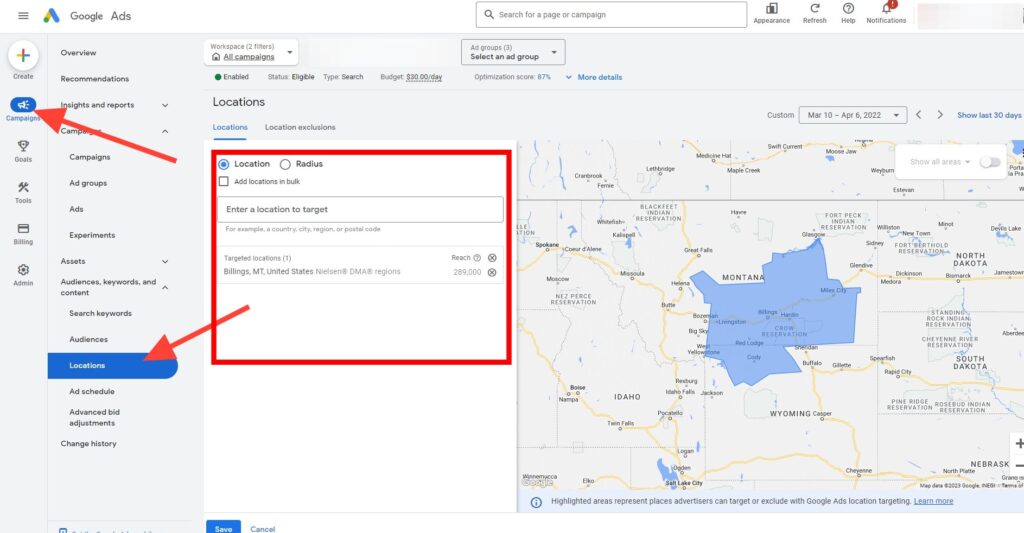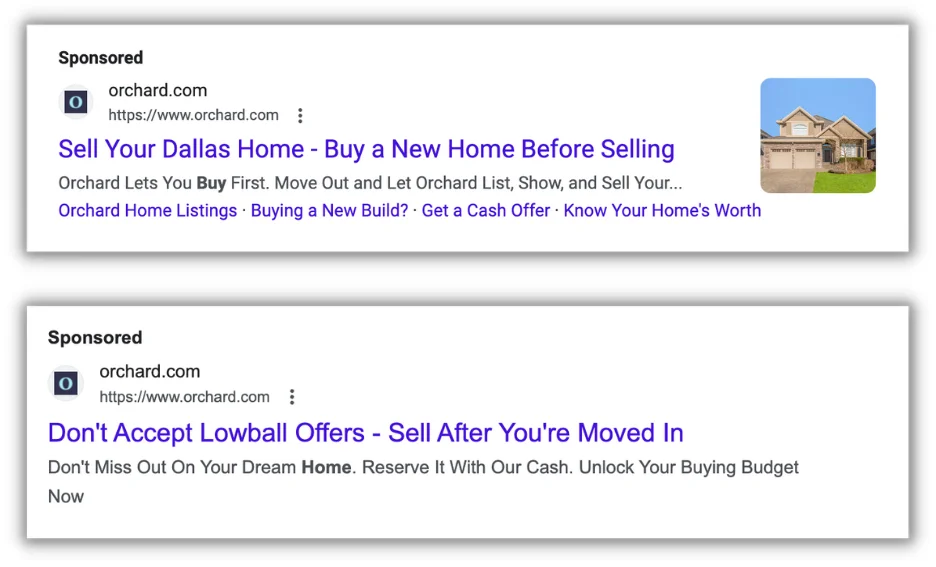How to run Google Ads for real estate

In the context of rapidly growing advertising and media methods, applying them to build and expand business activities in the real estate sector has become an inevitable trend. To help real estate advertising achieve maximum effectiveness, today RentAds will share with you how to run google ads for real estate. Let’s find out together!
Benefits of running Google Ads for real estate

It is no coincidence that Google Ads has become the top choice in modern real estate marketing strategies. While social media platforms like Facebook or TikTok mainly rely on user behavior to display ads, Google Ads takes a completely different approach – directly targeting existing customer demand through search keywords. This advertising method offers many benefits that other channels can hardly match.
Accurately reach target customers at the right time
Google Ads allows businesses to reach people who are actively searching for real estate – a highly qualified customer group. When users type keywords like “buy house in district 7” or “luxury apartment project near city center,” your ad will immediately appear at the top of the search results page. This is a big advantage, allowing you to let customers come to you instead of chasing after them.
Easily adjust ad content based on demand
Unlike traditional media or social platforms with complicated approval processes, Google Ads allows you to update ad content flexibly and quickly, within just 15 minutes. Whether you want to promote a new offer, introduce a recently launched project, or update product visuals, all actions can be done instantly and applied right away. This is especially suitable for real estate businesses that frequently update information based on market trends.
Flexible cost, performance aligned with budget
A major advantage of Google Ads is its pay-per-click (PPC) model. This means you only pay when someone is genuinely interested and clicks on your ad. Additionally, you have full control over your spending by setting a daily budget that matches your financial plan. This not only helps optimize your budget but also ensures that your campaign reaches the right audience at the right time.
Optimize conversion rate and reach potential customers
Unlike random ad placements, Google Ads targets users based on their existing needs. When users actively search for real estate information and click on your ad, the chances of turning them into actual customers are significantly higher. This opens up strong conversion opportunities—from submitting consultation forms and registering for project tours to signing contracts.
Support SEO strategy effectively and elevate brand reputation
Running Google Ads not only boosts immediate traffic but also indirectly strengthens your website’s SEO. When your site receives more visits and longer session times, Google considers it high-quality, which improves its organic ranking on search result pages. This offers long-term benefits, as your website can maintain a high position even after you stop advertising, helping you save costs and sustainably increase brand visibility.
How to run Google Ads for real estate

Running real estate ads on Google Ads is not simply about putting information online and waiting for customers to come. To be truly effective, you need a structured process, a clear strategy, and knowledge of how to take advantage of the tools that Google provides. Below are the key steps to help you implement an optimized Google Ads campaign for the real estate industry.
Analyze and select keywords strategically
Keywords are the core foundation of any search ad campaign. Don’t choose keywords based on feelings or imitation. Instead, put yourself in the customer’s shoes — what would they type into Google search when they want to buy, rent, or invest in real estate? Effective keywords usually combine the project name, location, and a specific action such as “buy Masteri Thao Dien apartment,” “rent street-front house in Hanoi,” or “cheap land for sale in District 9.” Identifying the right keywords helps you target the audience with real demand and increases conversion rates.
Set geographic targeting for your ads
Once you have a quality keyword set, the next step is to define the geographic area for your ad campaign. Google Ads allows you to customize where your ads appear — a huge advantage in the real estate sector. Focus your ads on the area where the project is located and nearby zones with high potential customers. Also, don’t overlook more distant areas where people are looking to invest or relocate — these audiences often convert well if your campaign addresses their needs.
Closely monitor campaign performance metrics
Setting up ads is just the beginning. Throughout the campaign, you need to continuously track key performance metrics such as click-through rate (CTR), landing page views, actions on the page (such as form submissions, phone calls, or Zalo chats), and especially cost-related metrics like CPC (cost per click) and CPA (cost per action). These figures not only help you evaluate the effectiveness of your campaign but also serve as the foundation for timely adjustments and ad optimization.
Optimize ads to improve performance
Optimizing Google Ads is a key factor in saving costs and increasing results. This includes improving ad content, adjusting keywords, testing different headline–description variations, selecting the right ad format, and fine-tuning bids based on performance. If you’re not familiar with optimization techniques, consider working with professional partners who have experience in Google advertising, especially in the real estate industry. They can help you create campaigns that are both attractive and effective without overspending.
Things to avoid when running Google Ads for real estate
Running real estate ads on Google Ads is a powerful marketing strategy, but if not executed properly, you can easily lose potential customers and waste your budget. Below are common mistakes you should avoid to make your campaign more effective.
Writing poor ad content with little persuasion
An ad that is poorly written and lacks highlights will make customers quickly scroll past without leaving any impression. Not only does it reduce the click-through rate, but it also makes your brand image appear unprofessional in the eyes of consumers. Take the time to invest in the headline, description, and call to action—these are the “emotional interface” that customers experience first.
Using improper navigation links
Adding links in ads is a smart way to lead customers where they need to go. However, a common mistake is directing users to the homepage in a generic way. Instead, you should link directly to a project page or a detailed article related to the ad content. Additionally, use links with keywords or call-to-action phrases to increase engagement and help customers access the information they care about more easily.
Lack of clear objectives and undefined KPIs
An effective advertising campaign cannot succeed without measurable key performance indicators (KPIs). Skipping the step of setting goals means you won’t know whether the campaign is working effectively, which makes it hard to adjust in time. Set KPIs for each stage—from clicks, conversions, to closing rate—and monitor them closely. If the numbers do not meet expectations, quickly analyze the cause and adjust your strategy.
Letting company information overshadow the project content
Many real estate advertisers focus too much on showcasing the company’s name and forget what customers truly care about: project details such as location, amenities, price, and investment potential. Overemphasizing the brand makes the ad feel rigid and lacking in practical value, leading users to skip it. Always place the customer at the center—focus on answering their questions and solving their problems instead of only talking about yourself.
Running real estate ads on Google Ads is not a matter of guesswork. It requires a clear strategy, a controlled process, and continuous monitoring. When done correctly, you not only increase the number of potential customers but also optimize marketing costs, thereby improving profits and boosting brand visibility in the highly competitive real estate market.
Contact Info
We provide services google ads account for rent nationwide, and with a team of experienced and qualified staff who both support advertising and can directly perform Facebook advertising if you need. Contact us via phone number.
Frequently Asked Questions
To choose effective keywords, you need to put yourself in the position of potential customers: what would they search on Google when they want to buy, sell, or rent real estate? Start with high-conversion keywords such as “cheap apartment for sale in district 7”, “whole house for rent in Hanoi”, or “land for sale in Binh Duong with red book”. Also, use tools like Google Keyword Planner to analyze search volume, competition level, and average cpc, then filter the most suitable keywords based on your budget and ad objectives.
The minimum budget can be flexible depending on the campaign goals and keyword competitiveness. However, for the real estate industry, where the cost per click (cpc) is relatively high, you should start with a budget of at least VND 5–10 million per month to collect enough data for optimization. During the initial phase, the most important thing is to monitor metrics like cpc, conversion rate, and quality score to adjust the campaign accordingly, before increasing the budget once the performance is effective.